TLH334 - Globalisation, Culture, and Planning a Food Business
VerifiedAdded on 2023/01/11
|9
|2465
|41
Essay
AI Summary
This essay discusses the impact of globalisation on food and drink consumption and its relationship with cultural identity, examining the key aspects of homogenisation and heterogenization. It also analyses the essential factors to consider when planning to open and operate a food business, including business concept, costs, location, menu, licensing, marketing, target customers, competition, and technology. The report concludes that gastronomy is crucial for creating high-quality food products while respecting cultural values, and a thorough understanding of the factors influencing food business planning is vital for success.

Gastronomy
Paraphrase This Document
Need a fresh take? Get an instant paraphrase of this document with our AI Paraphraser
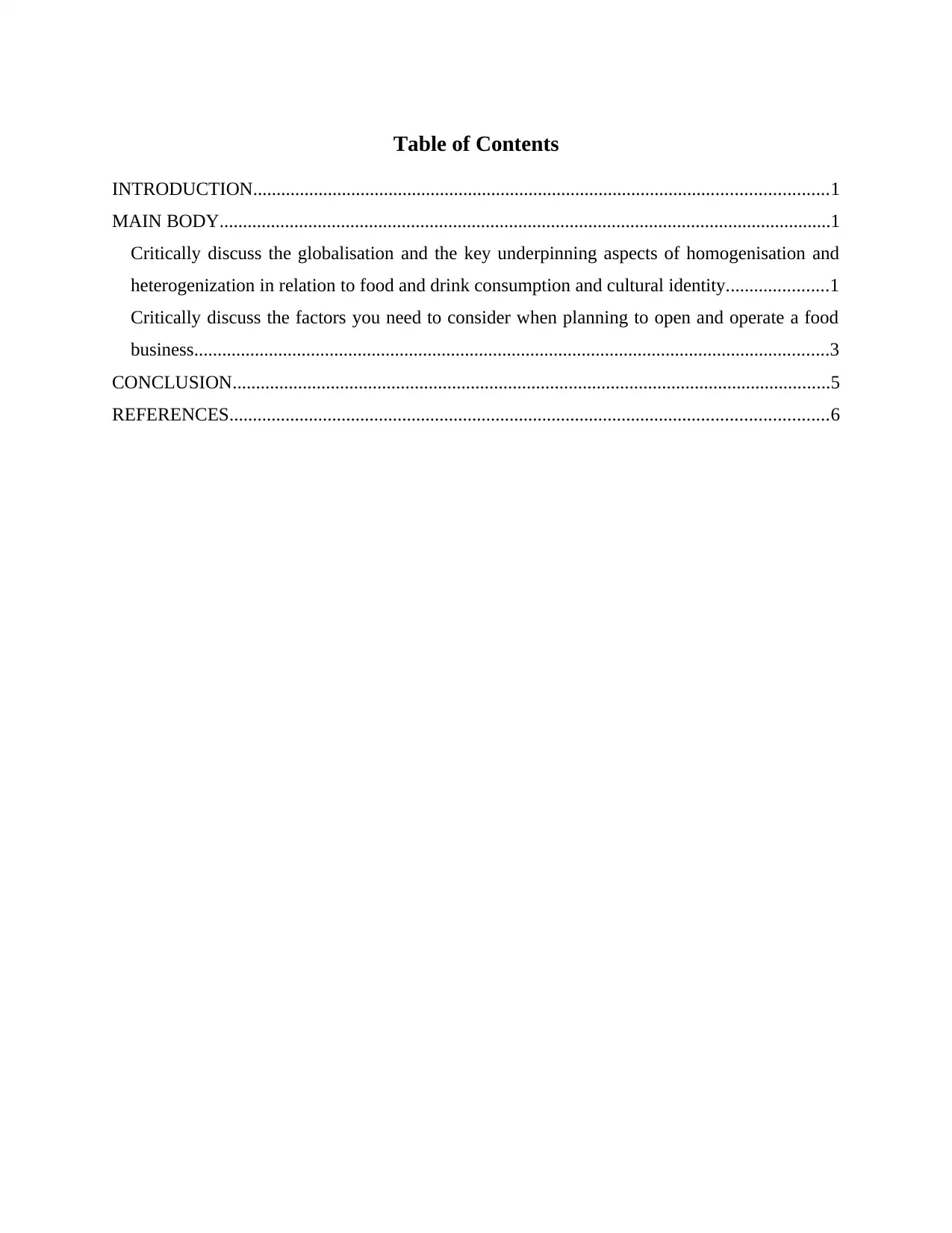
Table of Contents
INTRODUCTION...........................................................................................................................1
MAIN BODY...................................................................................................................................1
Critically discuss the globalisation and the key underpinning aspects of homogenisation and
heterogenization in relation to food and drink consumption and cultural identity......................1
Critically discuss the factors you need to consider when planning to open and operate a food
business........................................................................................................................................3
CONCLUSION................................................................................................................................5
REFERENCES................................................................................................................................6
INTRODUCTION...........................................................................................................................1
MAIN BODY...................................................................................................................................1
Critically discuss the globalisation and the key underpinning aspects of homogenisation and
heterogenization in relation to food and drink consumption and cultural identity......................1
Critically discuss the factors you need to consider when planning to open and operate a food
business........................................................................................................................................3
CONCLUSION................................................................................................................................5
REFERENCES................................................................................................................................6

⊘ This is a preview!⊘
Do you want full access?
Subscribe today to unlock all pages.

Trusted by 1+ million students worldwide
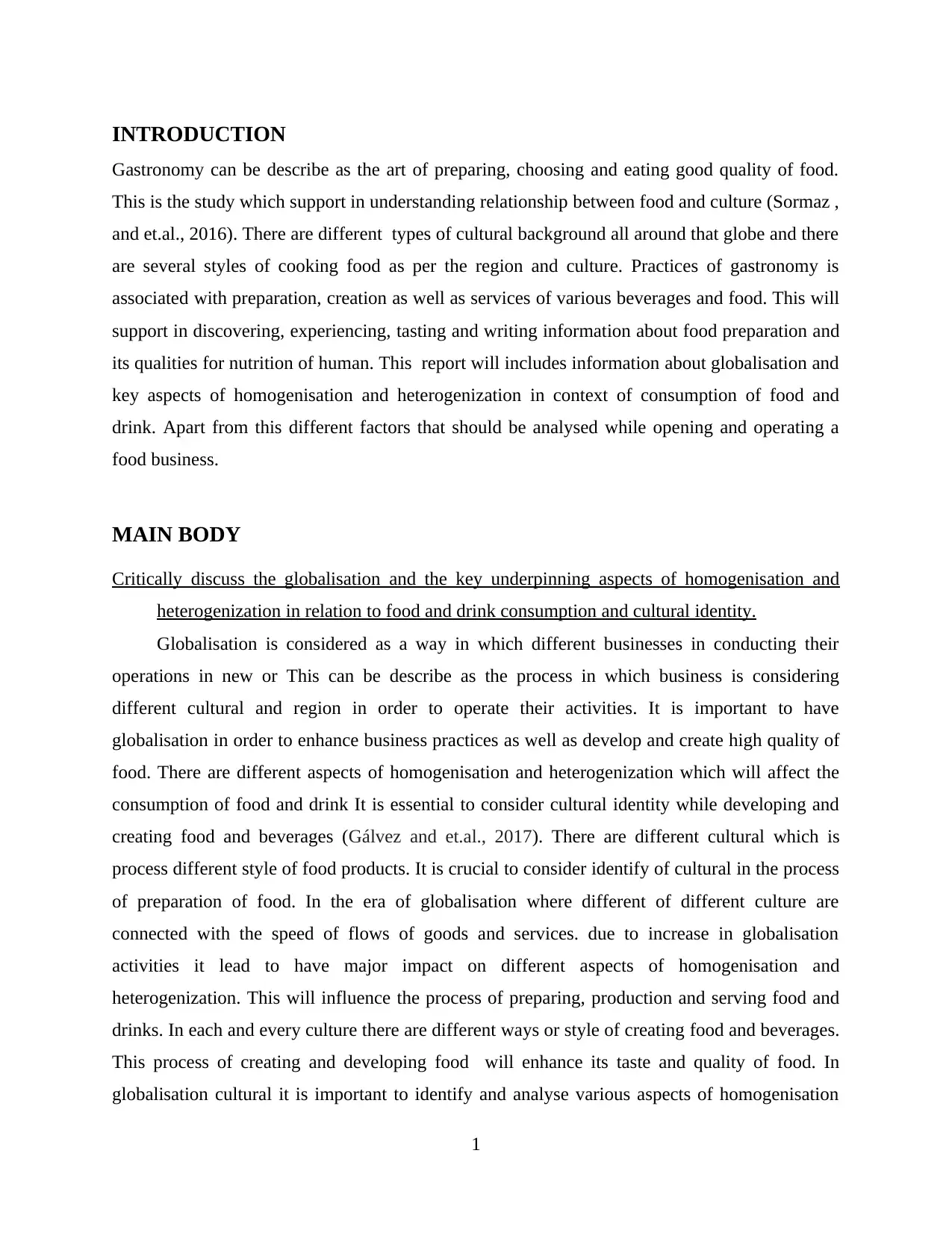
INTRODUCTION
Gastronomy can be describe as the art of preparing, choosing and eating good quality of food.
This is the study which support in understanding relationship between food and culture (Sormaz ,
and et.al., 2016). There are different types of cultural background all around that globe and there
are several styles of cooking food as per the region and culture. Practices of gastronomy is
associated with preparation, creation as well as services of various beverages and food. This will
support in discovering, experiencing, tasting and writing information about food preparation and
its qualities for nutrition of human. This report will includes information about globalisation and
key aspects of homogenisation and heterogenization in context of consumption of food and
drink. Apart from this different factors that should be analysed while opening and operating a
food business.
MAIN BODY
Critically discuss the globalisation and the key underpinning aspects of homogenisation and
heterogenization in relation to food and drink consumption and cultural identity.
Globalisation is considered as a way in which different businesses in conducting their
operations in new or This can be describe as the process in which business is considering
different cultural and region in order to operate their activities. It is important to have
globalisation in order to enhance business practices as well as develop and create high quality of
food. There are different aspects of homogenisation and heterogenization which will affect the
consumption of food and drink It is essential to consider cultural identity while developing and
creating food and beverages (Gálvez and et.al., 2017). There are different cultural which is
process different style of food products. It is crucial to consider identify of cultural in the process
of preparation of food. In the era of globalisation where different of different culture are
connected with the speed of flows of goods and services. due to increase in globalisation
activities it lead to have major impact on different aspects of homogenisation and
heterogenization. This will influence the process of preparing, production and serving food and
drinks. In each and every culture there are different ways or style of creating food and beverages.
This process of creating and developing food will enhance its taste and quality of food. In
globalisation cultural it is important to identify and analyse various aspects of homogenisation
1
Gastronomy can be describe as the art of preparing, choosing and eating good quality of food.
This is the study which support in understanding relationship between food and culture (Sormaz ,
and et.al., 2016). There are different types of cultural background all around that globe and there
are several styles of cooking food as per the region and culture. Practices of gastronomy is
associated with preparation, creation as well as services of various beverages and food. This will
support in discovering, experiencing, tasting and writing information about food preparation and
its qualities for nutrition of human. This report will includes information about globalisation and
key aspects of homogenisation and heterogenization in context of consumption of food and
drink. Apart from this different factors that should be analysed while opening and operating a
food business.
MAIN BODY
Critically discuss the globalisation and the key underpinning aspects of homogenisation and
heterogenization in relation to food and drink consumption and cultural identity.
Globalisation is considered as a way in which different businesses in conducting their
operations in new or This can be describe as the process in which business is considering
different cultural and region in order to operate their activities. It is important to have
globalisation in order to enhance business practices as well as develop and create high quality of
food. There are different aspects of homogenisation and heterogenization which will affect the
consumption of food and drink It is essential to consider cultural identity while developing and
creating food and beverages (Gálvez and et.al., 2017). There are different cultural which is
process different style of food products. It is crucial to consider identify of cultural in the process
of preparation of food. In the era of globalisation where different of different culture are
connected with the speed of flows of goods and services. due to increase in globalisation
activities it lead to have major impact on different aspects of homogenisation and
heterogenization. This will influence the process of preparing, production and serving food and
drinks. In each and every culture there are different ways or style of creating food and beverages.
This process of creating and developing food will enhance its taste and quality of food. In
globalisation cultural it is important to identify and analyse various aspects of homogenisation
1
Paraphrase This Document
Need a fresh take? Get an instant paraphrase of this document with our AI Paraphraser
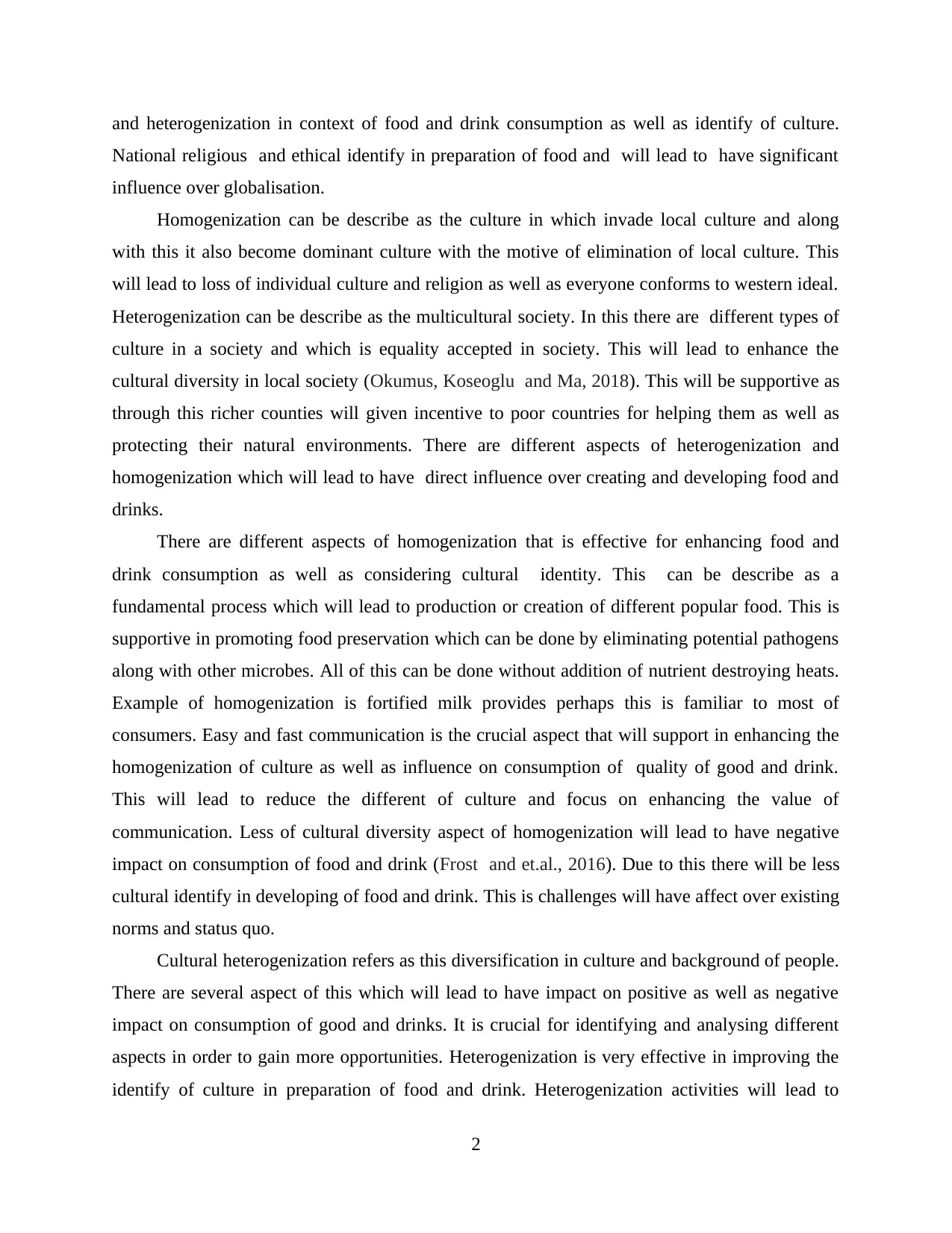
and heterogenization in context of food and drink consumption as well as identify of culture.
National religious and ethical identify in preparation of food and will lead to have significant
influence over globalisation.
Homogenization can be describe as the culture in which invade local culture and along
with this it also become dominant culture with the motive of elimination of local culture. This
will lead to loss of individual culture and religion as well as everyone conforms to western ideal.
Heterogenization can be describe as the multicultural society. In this there are different types of
culture in a society and which is equality accepted in society. This will lead to enhance the
cultural diversity in local society (Okumus, Koseoglu and Ma, 2018). This will be supportive as
through this richer counties will given incentive to poor countries for helping them as well as
protecting their natural environments. There are different aspects of heterogenization and
homogenization which will lead to have direct influence over creating and developing food and
drinks.
There are different aspects of homogenization that is effective for enhancing food and
drink consumption as well as considering cultural identity. This can be describe as a
fundamental process which will lead to production or creation of different popular food. This is
supportive in promoting food preservation which can be done by eliminating potential pathogens
along with other microbes. All of this can be done without addition of nutrient destroying heats.
Example of homogenization is fortified milk provides perhaps this is familiar to most of
consumers. Easy and fast communication is the crucial aspect that will support in enhancing the
homogenization of culture as well as influence on consumption of quality of good and drink.
This will lead to reduce the different of culture and focus on enhancing the value of
communication. Less of cultural diversity aspect of homogenization will lead to have negative
impact on consumption of food and drink (Frost and et.al., 2016). Due to this there will be less
cultural identify in developing of food and drink. This is challenges will have affect over existing
norms and status quo.
Cultural heterogenization refers as this diversification in culture and background of people.
There are several aspect of this which will lead to have impact on positive as well as negative
impact on consumption of good and drinks. It is crucial for identifying and analysing different
aspects in order to gain more opportunities. Heterogenization is very effective in improving the
identify of culture in preparation of food and drink. Heterogenization activities will lead to
2
National religious and ethical identify in preparation of food and will lead to have significant
influence over globalisation.
Homogenization can be describe as the culture in which invade local culture and along
with this it also become dominant culture with the motive of elimination of local culture. This
will lead to loss of individual culture and religion as well as everyone conforms to western ideal.
Heterogenization can be describe as the multicultural society. In this there are different types of
culture in a society and which is equality accepted in society. This will lead to enhance the
cultural diversity in local society (Okumus, Koseoglu and Ma, 2018). This will be supportive as
through this richer counties will given incentive to poor countries for helping them as well as
protecting their natural environments. There are different aspects of heterogenization and
homogenization which will lead to have direct influence over creating and developing food and
drinks.
There are different aspects of homogenization that is effective for enhancing food and
drink consumption as well as considering cultural identity. This can be describe as a
fundamental process which will lead to production or creation of different popular food. This is
supportive in promoting food preservation which can be done by eliminating potential pathogens
along with other microbes. All of this can be done without addition of nutrient destroying heats.
Example of homogenization is fortified milk provides perhaps this is familiar to most of
consumers. Easy and fast communication is the crucial aspect that will support in enhancing the
homogenization of culture as well as influence on consumption of quality of good and drink.
This will lead to reduce the different of culture and focus on enhancing the value of
communication. Less of cultural diversity aspect of homogenization will lead to have negative
impact on consumption of food and drink (Frost and et.al., 2016). Due to this there will be less
cultural identify in developing of food and drink. This is challenges will have affect over existing
norms and status quo.
Cultural heterogenization refers as this diversification in culture and background of people.
There are several aspect of this which will lead to have impact on positive as well as negative
impact on consumption of good and drinks. It is crucial for identifying and analysing different
aspects in order to gain more opportunities. Heterogenization is very effective in improving the
identify of culture in preparation of food and drink. Heterogenization activities will lead to
2
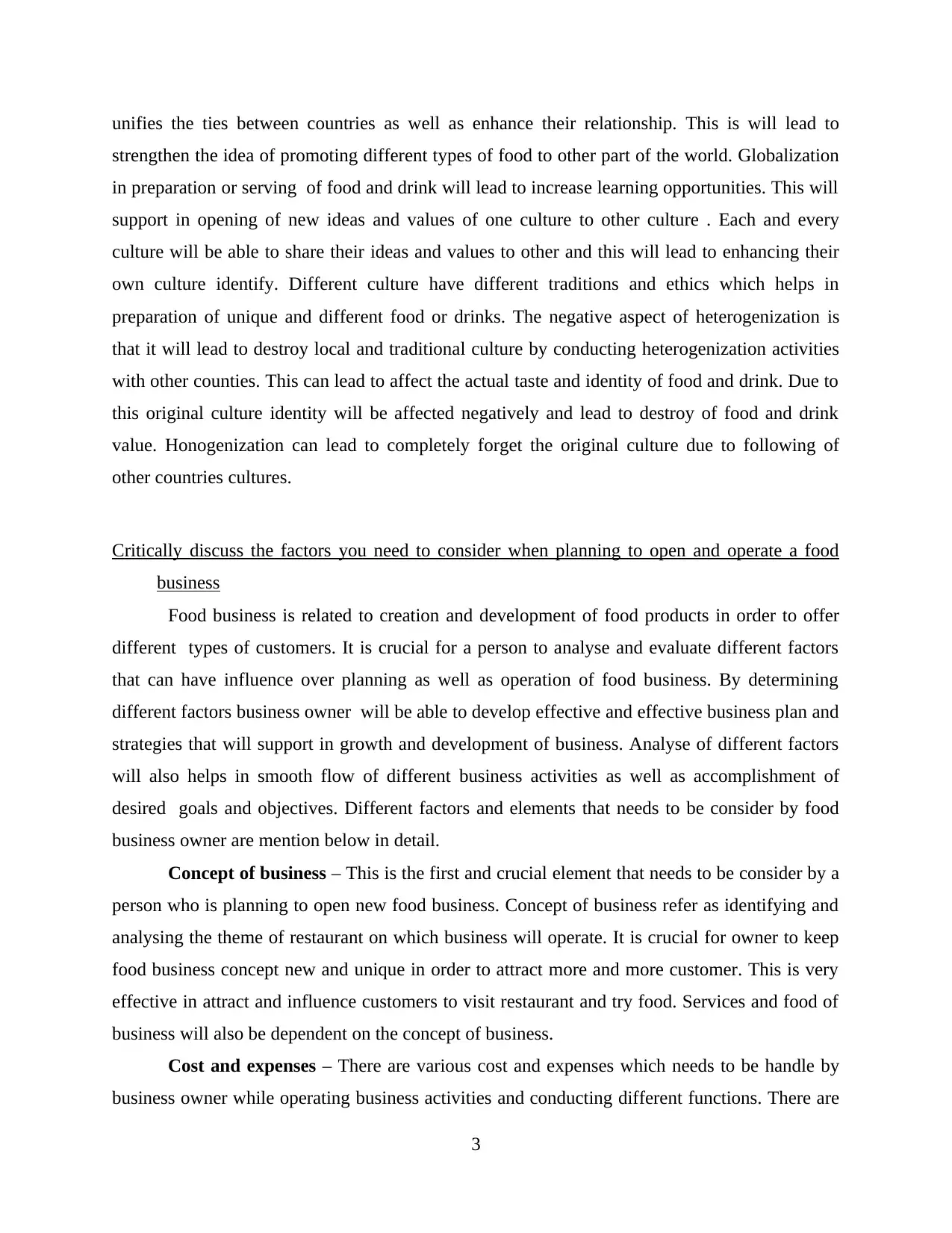
unifies the ties between countries as well as enhance their relationship. This is will lead to
strengthen the idea of promoting different types of food to other part of the world. Globalization
in preparation or serving of food and drink will lead to increase learning opportunities. This will
support in opening of new ideas and values of one culture to other culture . Each and every
culture will be able to share their ideas and values to other and this will lead to enhancing their
own culture identify. Different culture have different traditions and ethics which helps in
preparation of unique and different food or drinks. The negative aspect of heterogenization is
that it will lead to destroy local and traditional culture by conducting heterogenization activities
with other counties. This can lead to affect the actual taste and identity of food and drink. Due to
this original culture identity will be affected negatively and lead to destroy of food and drink
value. Honogenization can lead to completely forget the original culture due to following of
other countries cultures.
Critically discuss the factors you need to consider when planning to open and operate a food
business
Food business is related to creation and development of food products in order to offer
different types of customers. It is crucial for a person to analyse and evaluate different factors
that can have influence over planning as well as operation of food business. By determining
different factors business owner will be able to develop effective and effective business plan and
strategies that will support in growth and development of business. Analyse of different factors
will also helps in smooth flow of different business activities as well as accomplishment of
desired goals and objectives. Different factors and elements that needs to be consider by food
business owner are mention below in detail.
Concept of business – This is the first and crucial element that needs to be consider by a
person who is planning to open new food business. Concept of business refer as identifying and
analysing the theme of restaurant on which business will operate. It is crucial for owner to keep
food business concept new and unique in order to attract more and more customer. This is very
effective in attract and influence customers to visit restaurant and try food. Services and food of
business will also be dependent on the concept of business.
Cost and expenses – There are various cost and expenses which needs to be handle by
business owner while operating business activities and conducting different functions. There are
3
strengthen the idea of promoting different types of food to other part of the world. Globalization
in preparation or serving of food and drink will lead to increase learning opportunities. This will
support in opening of new ideas and values of one culture to other culture . Each and every
culture will be able to share their ideas and values to other and this will lead to enhancing their
own culture identify. Different culture have different traditions and ethics which helps in
preparation of unique and different food or drinks. The negative aspect of heterogenization is
that it will lead to destroy local and traditional culture by conducting heterogenization activities
with other counties. This can lead to affect the actual taste and identity of food and drink. Due to
this original culture identity will be affected negatively and lead to destroy of food and drink
value. Honogenization can lead to completely forget the original culture due to following of
other countries cultures.
Critically discuss the factors you need to consider when planning to open and operate a food
business
Food business is related to creation and development of food products in order to offer
different types of customers. It is crucial for a person to analyse and evaluate different factors
that can have influence over planning as well as operation of food business. By determining
different factors business owner will be able to develop effective and effective business plan and
strategies that will support in growth and development of business. Analyse of different factors
will also helps in smooth flow of different business activities as well as accomplishment of
desired goals and objectives. Different factors and elements that needs to be consider by food
business owner are mention below in detail.
Concept of business – This is the first and crucial element that needs to be consider by a
person who is planning to open new food business. Concept of business refer as identifying and
analysing the theme of restaurant on which business will operate. It is crucial for owner to keep
food business concept new and unique in order to attract more and more customer. This is very
effective in attract and influence customers to visit restaurant and try food. Services and food of
business will also be dependent on the concept of business.
Cost and expenses – There are various cost and expenses which needs to be handle by
business owner while operating business activities and conducting different functions. There are
3
⊘ This is a preview!⊘
Do you want full access?
Subscribe today to unlock all pages.

Trusted by 1+ million students worldwide
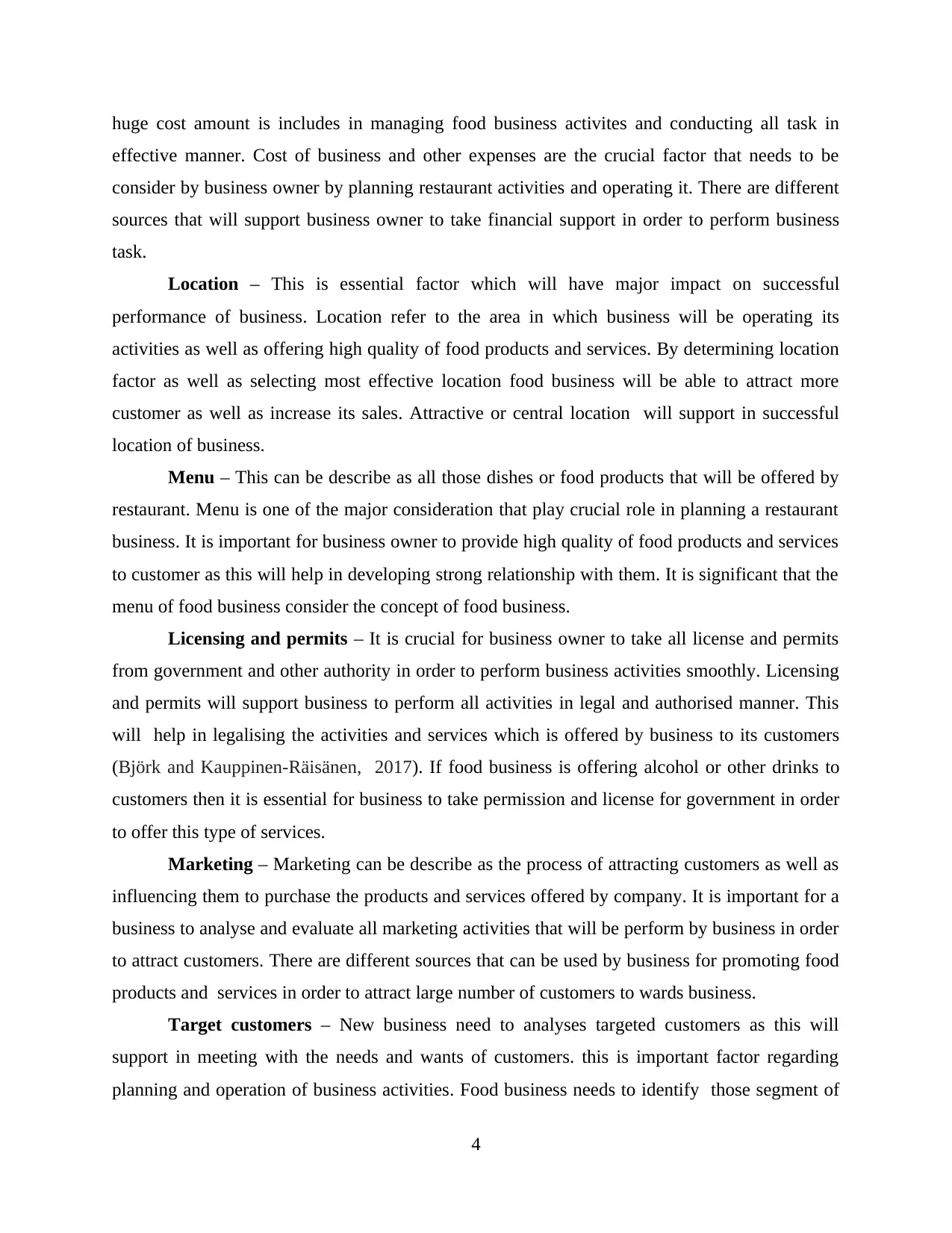
huge cost amount is includes in managing food business activites and conducting all task in
effective manner. Cost of business and other expenses are the crucial factor that needs to be
consider by business owner by planning restaurant activities and operating it. There are different
sources that will support business owner to take financial support in order to perform business
task.
Location – This is essential factor which will have major impact on successful
performance of business. Location refer to the area in which business will be operating its
activities as well as offering high quality of food products and services. By determining location
factor as well as selecting most effective location food business will be able to attract more
customer as well as increase its sales. Attractive or central location will support in successful
location of business.
Menu – This can be describe as all those dishes or food products that will be offered by
restaurant. Menu is one of the major consideration that play crucial role in planning a restaurant
business. It is important for business owner to provide high quality of food products and services
to customer as this will help in developing strong relationship with them. It is significant that the
menu of food business consider the concept of food business.
Licensing and permits – It is crucial for business owner to take all license and permits
from government and other authority in order to perform business activities smoothly. Licensing
and permits will support business to perform all activities in legal and authorised manner. This
will help in legalising the activities and services which is offered by business to its customers
(Björk and Kauppinen-Räisänen, 2017). If food business is offering alcohol or other drinks to
customers then it is essential for business to take permission and license for government in order
to offer this type of services.
Marketing – Marketing can be describe as the process of attracting customers as well as
influencing them to purchase the products and services offered by company. It is important for a
business to analyse and evaluate all marketing activities that will be perform by business in order
to attract customers. There are different sources that can be used by business for promoting food
products and services in order to attract large number of customers to wards business.
Target customers – New business need to analyses targeted customers as this will
support in meeting with the needs and wants of customers. this is important factor regarding
planning and operation of business activities. Food business needs to identify those segment of
4
effective manner. Cost of business and other expenses are the crucial factor that needs to be
consider by business owner by planning restaurant activities and operating it. There are different
sources that will support business owner to take financial support in order to perform business
task.
Location – This is essential factor which will have major impact on successful
performance of business. Location refer to the area in which business will be operating its
activities as well as offering high quality of food products and services. By determining location
factor as well as selecting most effective location food business will be able to attract more
customer as well as increase its sales. Attractive or central location will support in successful
location of business.
Menu – This can be describe as all those dishes or food products that will be offered by
restaurant. Menu is one of the major consideration that play crucial role in planning a restaurant
business. It is important for business owner to provide high quality of food products and services
to customer as this will help in developing strong relationship with them. It is significant that the
menu of food business consider the concept of food business.
Licensing and permits – It is crucial for business owner to take all license and permits
from government and other authority in order to perform business activities smoothly. Licensing
and permits will support business to perform all activities in legal and authorised manner. This
will help in legalising the activities and services which is offered by business to its customers
(Björk and Kauppinen-Räisänen, 2017). If food business is offering alcohol or other drinks to
customers then it is essential for business to take permission and license for government in order
to offer this type of services.
Marketing – Marketing can be describe as the process of attracting customers as well as
influencing them to purchase the products and services offered by company. It is important for a
business to analyse and evaluate all marketing activities that will be perform by business in order
to attract customers. There are different sources that can be used by business for promoting food
products and services in order to attract large number of customers to wards business.
Target customers – New business need to analyses targeted customers as this will
support in meeting with the needs and wants of customers. this is important factor regarding
planning and operation of business activities. Food business needs to identify those segment of
4
Paraphrase This Document
Need a fresh take? Get an instant paraphrase of this document with our AI Paraphraser
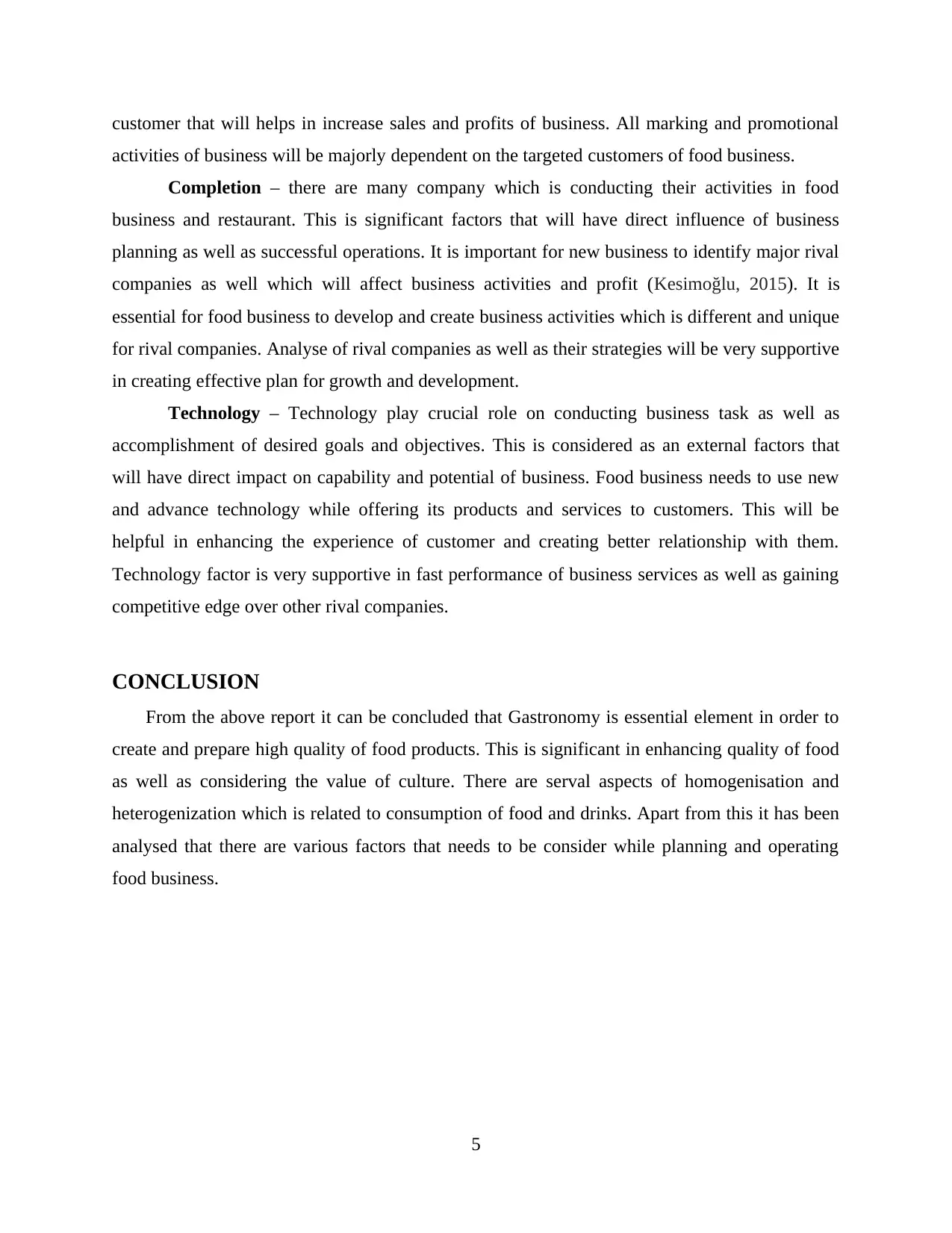
customer that will helps in increase sales and profits of business. All marking and promotional
activities of business will be majorly dependent on the targeted customers of food business.
Completion – there are many company which is conducting their activities in food
business and restaurant. This is significant factors that will have direct influence of business
planning as well as successful operations. It is important for new business to identify major rival
companies as well which will affect business activities and profit (Kesimoğlu, 2015). It is
essential for food business to develop and create business activities which is different and unique
for rival companies. Analyse of rival companies as well as their strategies will be very supportive
in creating effective plan for growth and development.
Technology – Technology play crucial role on conducting business task as well as
accomplishment of desired goals and objectives. This is considered as an external factors that
will have direct impact on capability and potential of business. Food business needs to use new
and advance technology while offering its products and services to customers. This will be
helpful in enhancing the experience of customer and creating better relationship with them.
Technology factor is very supportive in fast performance of business services as well as gaining
competitive edge over other rival companies.
CONCLUSION
From the above report it can be concluded that Gastronomy is essential element in order to
create and prepare high quality of food products. This is significant in enhancing quality of food
as well as considering the value of culture. There are serval aspects of homogenisation and
heterogenization which is related to consumption of food and drinks. Apart from this it has been
analysed that there are various factors that needs to be consider while planning and operating
food business.
5
activities of business will be majorly dependent on the targeted customers of food business.
Completion – there are many company which is conducting their activities in food
business and restaurant. This is significant factors that will have direct influence of business
planning as well as successful operations. It is important for new business to identify major rival
companies as well which will affect business activities and profit (Kesimoğlu, 2015). It is
essential for food business to develop and create business activities which is different and unique
for rival companies. Analyse of rival companies as well as their strategies will be very supportive
in creating effective plan for growth and development.
Technology – Technology play crucial role on conducting business task as well as
accomplishment of desired goals and objectives. This is considered as an external factors that
will have direct impact on capability and potential of business. Food business needs to use new
and advance technology while offering its products and services to customers. This will be
helpful in enhancing the experience of customer and creating better relationship with them.
Technology factor is very supportive in fast performance of business services as well as gaining
competitive edge over other rival companies.
CONCLUSION
From the above report it can be concluded that Gastronomy is essential element in order to
create and prepare high quality of food products. This is significant in enhancing quality of food
as well as considering the value of culture. There are serval aspects of homogenisation and
heterogenization which is related to consumption of food and drinks. Apart from this it has been
analysed that there are various factors that needs to be consider while planning and operating
food business.
5
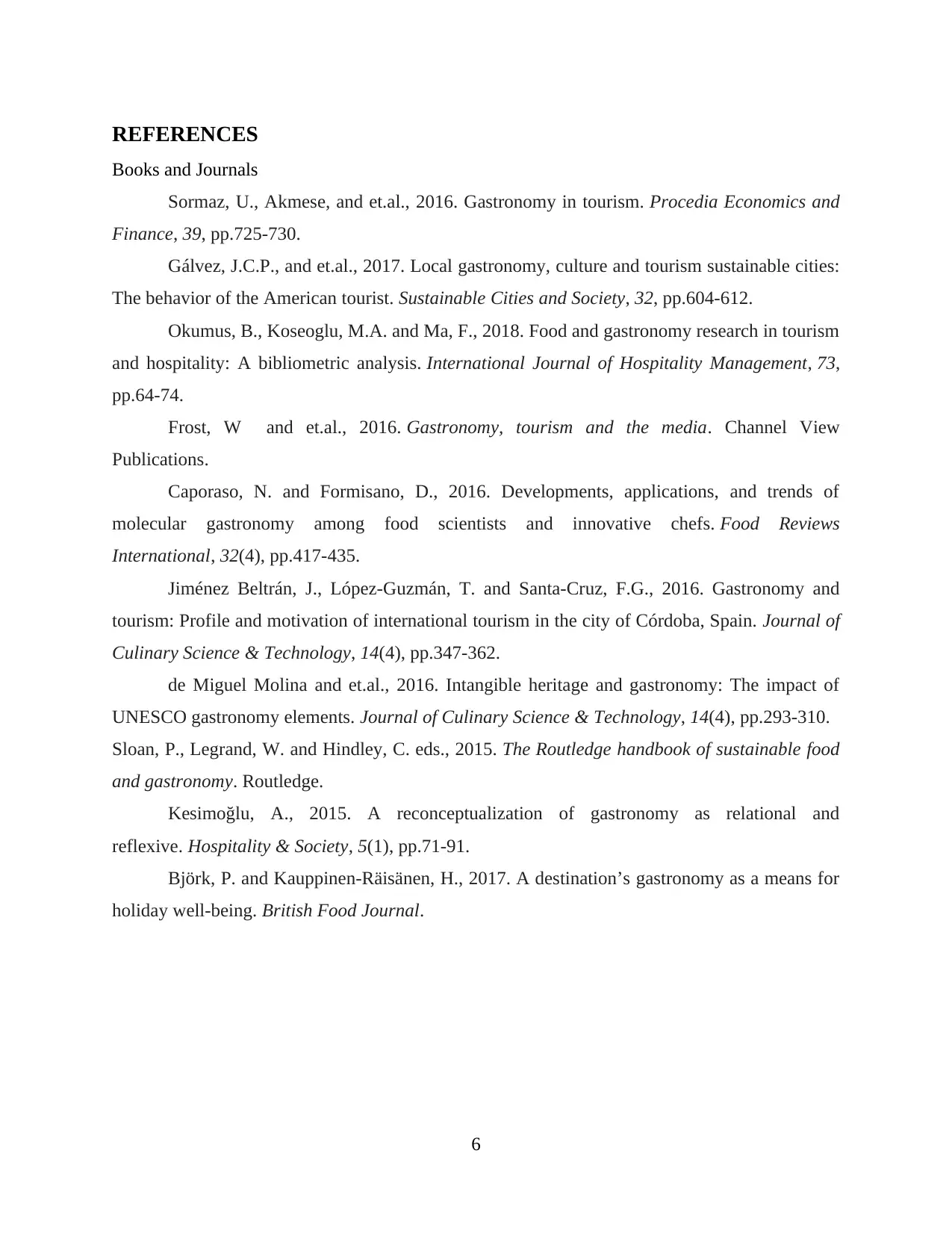
REFERENCES
Books and Journals
Sormaz, U., Akmese, and et.al., 2016. Gastronomy in tourism. Procedia Economics and
Finance, 39, pp.725-730.
Gálvez, J.C.P., and et.al., 2017. Local gastronomy, culture and tourism sustainable cities:
The behavior of the American tourist. Sustainable Cities and Society, 32, pp.604-612.
Okumus, B., Koseoglu, M.A. and Ma, F., 2018. Food and gastronomy research in tourism
and hospitality: A bibliometric analysis. International Journal of Hospitality Management, 73,
pp.64-74.
Frost, W and et.al., 2016. Gastronomy, tourism and the media. Channel View
Publications.
Caporaso, N. and Formisano, D., 2016. Developments, applications, and trends of
molecular gastronomy among food scientists and innovative chefs. Food Reviews
International, 32(4), pp.417-435.
Jiménez Beltrán, J., López-Guzmán, T. and Santa-Cruz, F.G., 2016. Gastronomy and
tourism: Profile and motivation of international tourism in the city of Córdoba, Spain. Journal of
Culinary Science & Technology, 14(4), pp.347-362.
de Miguel Molina and et.al., 2016. Intangible heritage and gastronomy: The impact of
UNESCO gastronomy elements. Journal of Culinary Science & Technology, 14(4), pp.293-310.
Sloan, P., Legrand, W. and Hindley, C. eds., 2015. The Routledge handbook of sustainable food
and gastronomy. Routledge.
Kesimoğlu, A., 2015. A reconceptualization of gastronomy as relational and
reflexive. Hospitality & Society, 5(1), pp.71-91.
Björk, P. and Kauppinen-Räisänen, H., 2017. A destination’s gastronomy as a means for
holiday well-being. British Food Journal.
6
Books and Journals
Sormaz, U., Akmese, and et.al., 2016. Gastronomy in tourism. Procedia Economics and
Finance, 39, pp.725-730.
Gálvez, J.C.P., and et.al., 2017. Local gastronomy, culture and tourism sustainable cities:
The behavior of the American tourist. Sustainable Cities and Society, 32, pp.604-612.
Okumus, B., Koseoglu, M.A. and Ma, F., 2018. Food and gastronomy research in tourism
and hospitality: A bibliometric analysis. International Journal of Hospitality Management, 73,
pp.64-74.
Frost, W and et.al., 2016. Gastronomy, tourism and the media. Channel View
Publications.
Caporaso, N. and Formisano, D., 2016. Developments, applications, and trends of
molecular gastronomy among food scientists and innovative chefs. Food Reviews
International, 32(4), pp.417-435.
Jiménez Beltrán, J., López-Guzmán, T. and Santa-Cruz, F.G., 2016. Gastronomy and
tourism: Profile and motivation of international tourism in the city of Córdoba, Spain. Journal of
Culinary Science & Technology, 14(4), pp.347-362.
de Miguel Molina and et.al., 2016. Intangible heritage and gastronomy: The impact of
UNESCO gastronomy elements. Journal of Culinary Science & Technology, 14(4), pp.293-310.
Sloan, P., Legrand, W. and Hindley, C. eds., 2015. The Routledge handbook of sustainable food
and gastronomy. Routledge.
Kesimoğlu, A., 2015. A reconceptualization of gastronomy as relational and
reflexive. Hospitality & Society, 5(1), pp.71-91.
Björk, P. and Kauppinen-Räisänen, H., 2017. A destination’s gastronomy as a means for
holiday well-being. British Food Journal.
6
⊘ This is a preview!⊘
Do you want full access?
Subscribe today to unlock all pages.

Trusted by 1+ million students worldwide
1 out of 9
Related Documents
Your All-in-One AI-Powered Toolkit for Academic Success.
+13062052269
info@desklib.com
Available 24*7 on WhatsApp / Email
![[object Object]](/_next/static/media/star-bottom.7253800d.svg)
Unlock your academic potential
Copyright © 2020–2026 A2Z Services. All Rights Reserved. Developed and managed by ZUCOL.





